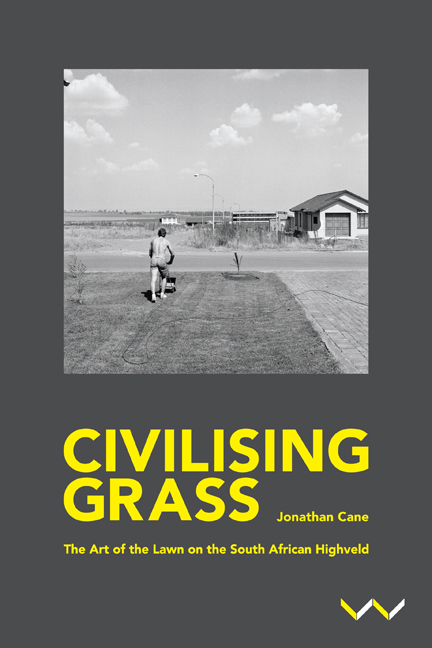
-
Select format
-
- Publisher:
- Wits University Press
- Publication date:
- October 2019
- July 2019
- ISBN:
- 9781776143115
- 9781776143108
- Dimensions:
- Weight & Pages:
- Dimensions:
- Weight & Pages:
- Subjects:
- Classical Studies, Classical Literature
You may already have access via personal or institutional login- Subjects:
- Classical Studies, Classical Literature
Book description
What does the lawn want? To be watered, fertilised, mowed, admired, fretted over, ignored? This unusual question serves as a starting point for Civilising Grass: The Art of the Lawn on the South African Highveld, an unexpected and often disconcerting critique of one of the most common and familiar landscapes in South Africa. The lawn, Jonathan Cane argues, is not quite as innocent as we might think. Besides the fact that lawns suck up scarce water, consume chemicals, displace indigenous plants and reduce biodiversity, they are also part of a colonial lineage of dispossession and violence. They reduce the political problem of land to the aesthetic question of landscape, thereby obscuring issues of ownership, redress, belonging and labour. The question then becomes: Who takes care of whose lawn, in what clothes, under what conditions and for what reward? Civilising Grass offers a detailed reading of artistic, literary and architectural lawns between 1886 and 2017. The eclectic archive includes plans, poems, maps, gardening blogs, adverts, ethnographies and ephemera, as well as literature by Koos Prinsloo, Marlene van Niekerk and Ivan Vladislavić. In addition, the book includes colour reproductions of lawn artworks by David Goldblatt, Lungiswa Gqunta, Pieter Hugo, Anton Kannemeyer, Sabelo Mlangeni, Moses Tladi and Kemang Wa Lehulere. This book shows that even if the enchantment of a green, flat and soft lawn is almost universal, there are also unexpected moments when alternatives present themselves, occasions when people reject the politeness of the lawn, and situations in which we might glimpse a possible time after the lawn. Drawing on theory and conceptual tools from interdisciplinary fields such as ecocriticism, queer theory, art history and postcolonial studies, Civilising Grass offers the first sustained investigation of the lawn in Africa and contributes to the growing conversation about the complex relationships between humans and non-humans on the continent.
Contents
Metrics
Full text views
Full text views help Loading metrics...
Loading metrics...
* Views captured on Cambridge Core between #date#. This data will be updated every 24 hours.
Usage data cannot currently be displayed.
Accessibility standard: Unknown
Why this information is here
This section outlines the accessibility features of this content - including support for screen readers, full keyboard navigation and high-contrast display options. This may not be relevant for you.
Accessibility Information
Accessibility compliance for the PDF of this book is currently unknown and may be updated in the future.

